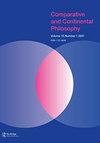Ueda Shizuteru’s Philosophy of the Twofold
IF 0.3
0 PHILOSOPHY
引用次数: 0
Abstract
ABSTRACT In this paper, I explicate Ueda Shizuteru’s philosophy of the twofold being-in-the-world and the ethics he draws from it. Ueda provides an original reading of Nishida’s concept of pure experience and develops it together with an understanding of Nishida’s concept of place by combining it with the phenomenological notion of the horizon. This leads him to understand the world, or place wherein we are, as twofold, implying the semantic space or network of meanings within it, on the one hand, and, on the other hand, the boundless or undetermined open which envelops the former as its other. Our being as being-in-the-world is thus also twofold in implying both sides of the horizon, inside and outside, whereby we are ontologically grounded but at the same time without ground in being suspended by the semantic emptiness and ontological nothingness lying beyond.上田静茹的双重哲学
本文阐述了上田静久的“双重存在”哲学及其从中汲取的伦理学思想。上田提供了对西田纯经验概念的原始解读,并将其与对西田地方概念的理解结合起来,将其与现象学的视界概念结合起来。这使他把我们所处的世界或地方理解为双重的,一方面暗示着其中的语义空间或意义网络,另一方面,无边无际或不确定的开放包围着前者作为它的另一方。因此,我们作为在世界中的存在的存在也具有两面性,它蕴涵着视界的内外两面,在视界中,我们在本体论上是有根据的,但同时又没有根据,因为我们被超越的语义空虚和本体论的虚无所悬浮。
本文章由计算机程序翻译,如有差异,请以英文原文为准。
求助全文
约1分钟内获得全文
求助全文

 求助内容:
求助内容: 应助结果提醒方式:
应助结果提醒方式:


